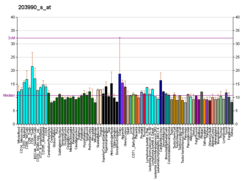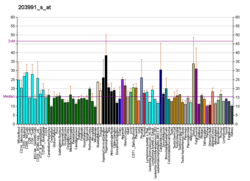UTX (gene)
Lysine-specific demethylase 6A also known as Ubiquitously transcribed tetratricopeptide repeat, X chromosome (UTX), is a protein which in humans is encoded by the KDM6A gene.[5][6][7] It belongs to the 2-oxoglutarate (2OG)-dependent dioxygenase superfamily.
Function
UTX has been linked with demethylation of lysine residues on histone, in particular H3K27, resulting in a gene de-repression, a potential means of regulating cellular metabolism.[8]
References
- GRCh38: Ensembl release 89: ENSG00000147050 - Ensembl, May 2017
- GRCm38: Ensembl release 89: ENSMUSG00000037369 - Ensembl, May 2017
- "Human PubMed Reference:". National Center for Biotechnology Information, U.S. National Library of Medicine.
- "Mouse PubMed Reference:". National Center for Biotechnology Information, U.S. National Library of Medicine.
- "Entrez Gene: KDM6A lysine demethylase 6A".
- Lahn BT, Page DC (October 1997). "Functional coherence of the human Y chromosome". Science. 278 (5338): 675–80. doi:10.1126/science.278.5338.675. PMID 9381176.
- Greenfield A, Carrel L, Pennisi D, Philippe C, Quaderi N, Siggers P, Steiner K, Tam PP, Monaco AP, Willard HF, Koopman P (April 1998). "The UTX gene escapes X inactivation in mice and humans". Hum. Mol. Genet. 7 (4): 737–42. doi:10.1093/hmg/7.4.737. PMID 9499428.
- Lee MG, Villa R, Trojer P, Norman J, Yan KP, Reinberg D, Di Croce L, Shiekhattar R (October 2007). "Demethylation of H3K27 regulates polycomb recruitment and H2A ubiquitination". Science. 318 (5849): 447–50. doi:10.1126/science.1149042. PMID 17761849.
Further reading
- Lahn BT, Page DC (1997). "Functional coherence of the human Y chromosome". Science. 278 (5338): 675–80. doi:10.1126/science.278.5338.675. PMID 9381176.
- Greenfield A, Carrel L, Pennisi D, et al. (1998). "The UTX gene escapes X inactivation in mice and humans". Hum. Mol. Genet. 7 (4): 737–42. doi:10.1093/hmg/7.4.737. PMID 9499428.
- Grbavec D, Lo R, Liu Y, et al. (1999). "Groucho/transducin-like enhancer of split (TLE) family members interact with the yeast transcriptional co-repressor SSN6 and mammalian SSN6-related proteins: implications for evolutionary conservation of transcription repression mechanisms". Biochem. J. 337 ( Pt 1) (Pt 1): 13–7. doi:10.1042/0264-6021:3370013. PMC 1219929. PMID 9854018.
- Foresta C, Ferlin A, Moro E (2000). "Deletion and expression analysis of AZFa genes on the human Y chromosome revealed a major role for DBY in male infertility". Hum. Mol. Genet. 9 (8): 1161–9. doi:10.1093/hmg/9.8.1161. PMID 10767340.
- Strausberg RL, Feingold EA, Grouse LH, et al. (2003). "Generation and initial analysis of more than 15,000 full-length human and mouse cDNA sequences". Proc. Natl. Acad. Sci. U.S.A. 99 (26): 16899–903. doi:10.1073/pnas.242603899. PMC 139241. PMID 12477932.
- Agate RJ, Choe M, Arnold AP (2004). "Sex differences in structure and expression of the sex chromosome genes CHD1Z and CHD1W in zebra finches". Mol. Biol. Evol. 21 (2): 384–96. doi:10.1093/molbev/msh027. PMID 14660691.
- Colland F, Jacq X, Trouplin V, et al. (2004). "Functional Proteomics Mapping of a Human Signaling Pathway". Genome Res. 14 (7): 1324–32. doi:10.1101/gr.2334104. PMC 442148. PMID 15231748.
- Beausoleil SA, Jedrychowski M, Schwartz D, et al. (2004). "Large-scale characterization of HeLa cell nuclear phosphoproteins". Proc. Natl. Acad. Sci. U.S.A. 101 (33): 12130–5. doi:10.1073/pnas.0404720101. PMC 514446. PMID 15302935.
- Ballif BA, Villén J, Beausoleil SA, et al. (2005). "Phosphoproteomic analysis of the developing mouse brain". Mol. Cell. Proteomics. 3 (11): 1093–101. doi:10.1074/mcp.M400085-MCP200. PMID 15345747.
- Gerrard DT, Filatov DA (2005). "Positive and negative selection on mammalian Y chromosomes". Mol. Biol. Evol. 22 (6): 1423–32. doi:10.1093/molbev/msi128. PMID 15758204.
- Cho YW, Hong T, Hong S, et al. (2007). "PTIP Associates with MLL3- and MLL4-containing Histone H3 Lysine 4 Methyltransferase Complex". J. Biol. Chem. 282 (28): 20395–406. doi:10.1074/jbc.M701574200. PMC 2729684. PMID 17500065.
- Agger K, Cloos PA, Christensen J, et al. (2007). "UTX and JMJD3 are histone H3K27 demethylases involved in HOX gene regulation and development". Nature. 449 (7163): 731–4. doi:10.1038/nature06145. PMID 17713478.
- Lee MG, Villa R, Trojer P, et al. (2007). "Demethylation of H3K27 regulates polycomb recruitment and H2A ubiquitination". Science. 318 (5849): 447–50. doi:10.1126/science.1149042. PMID 17761849.
- Lan F, Bayliss PE, Rinn JL, et al. (2007). "A histone H3 lysine 27 demethylase regulates animal posterior development". Nature. 449 (7163): 689–94. doi:10.1038/nature06192. PMID 17851529.
- Hong S, Cho YW, Yu LR, et al. (2008). "Identification of JmjC domain-containing UTX and JMJD3 as histone H3 lysine 27 demethylases". Proc. Natl. Acad. Sci. U.S.A. 104 (47): 18439–44. doi:10.1073/pnas.0707292104. PMC 2141795. PMID 18003914.
This article is issued from Wikipedia. The text is licensed under Creative Commons - Attribution - Sharealike. Additional terms may apply for the media files.






